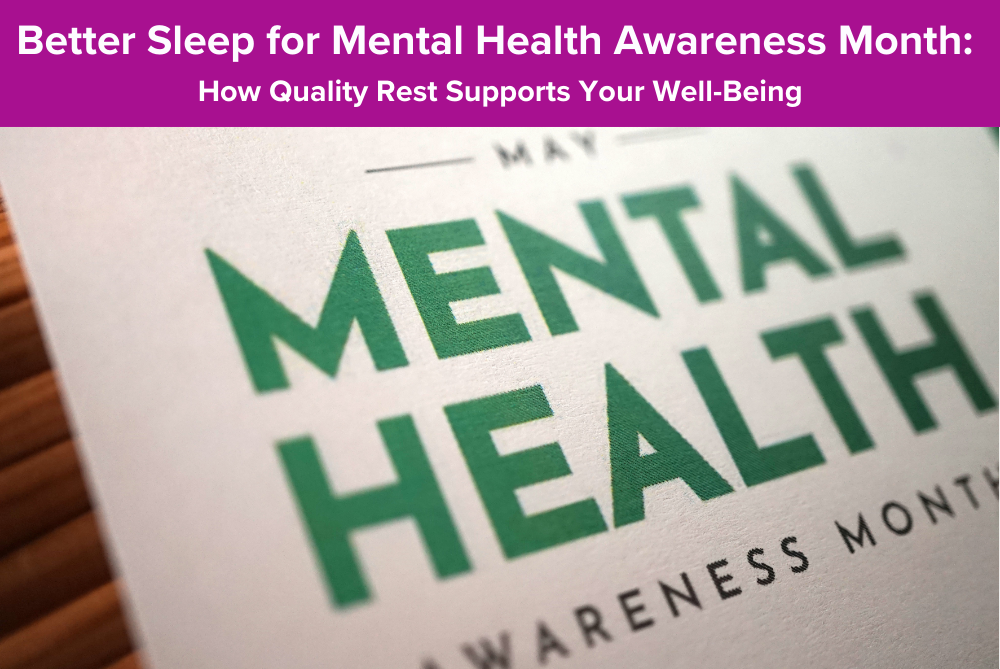 The Connection Between Sleep and Mental Health
The Connection Between Sleep and Mental Health
May is Mental Health Awareness Month, an important time to recognize the role sleep plays in emotional and psychological well-being. Studies show that poor sleep can lead to increased stress, anxiety, and depression, while high-quality sleep enhances emotional resilience, cognitive function, and overall mental health.
At Sleep Medicine Consultants, we understand the critical link between sleep and mental well-being. If you struggle with insomnia, sleep apnea, or other sleep disorders, improving your rest could be the key to a healthier mind.
How Sleep Affects Mental Health
1. Sleep Reduces Stress and Anxiety
A well-rested brain processes emotions better, reducing daily stress and preventing anxiety from spiraling out of control. Chronic sleep deprivation can lead to an overactive amygdala—the brain’s fear center—heightening stress responses.
2. Lack of Sleep Increases Depression Risk
People with chronic insomnia are 10 times more likely to develop depression. Sleep deprivation affects serotonin production, a neurotransmitter that regulates mood.
3. Rest Improves Cognitive Function
During deep sleep, the brain consolidates memories, processes emotions, and clears out toxins. Without enough rest, you may experience brain fog, difficulty concentrating, and impaired decision-making.
4. Better Sleep Boosts Emotional Regulation
A well-rested person is more capable of managing emotions and handling daily stressors. Poor sleep, on the other hand, can lead to irritability, mood swings, and difficulty coping with life’s challenges.
Local Tie-In: Mental Health Walks & Wellness Events in Austin
Austin offers several community events and wellness programs that support both mental health and sleep hygiene. These activities encourage relaxation, mindfulness, and stress reduction—key components of a good night’s sleep.
🏞️ Austin’s Mental Health Walks
- Hike & Heal Austin
- Location: Various trails around Austin
- Benefits: Combines physical exercise, social interaction, and time in nature—all proven to enhance sleep and mental well-being.
- The Trail Foundation – Mindful Walks
- Location: Ann & Roy Butler Hike-and-Bike Trail
- Benefits: Guided mindful walking sessions that promote relaxation and stress reduction.
🧘 Yoga and Meditation for Sleep
- Black Swan Yoga
- Offers evening yoga classes designed to help with relaxation and stress relief.
- Locations: Various locations across Austin
- Meditation Bar
- A local meditation studio offering guided sleep meditation sessions.
- Location: 8108 Mesa Dr. Ste B-103, Austin, TX
- Austin Mindfulness Center
- Provides mindfulness-based stress reduction (MBSR) courses to help improve sleep and reduce anxiety.
🏥 Mental Health and Sleep Resources in Austin
- Integral Care – Offers mental health support, including therapy and counseling.
- Austin Center for Therapy & Assessment – Specializes in treating sleep disorders and anxiety.
- Sleep Medicine Consultants – Comprehensive sleep evaluation, sleep studies, and treatment for insomnia, sleep apnea, and other sleep disorders.
Sleep Hygiene Tips for Better Mental Health
- Maintain a Consistent Sleep Schedule
- Go to bed and wake up at the same time every day, even on weekends.
- This helps regulate your circadian rhythm, improving sleep quality.
- Create a Relaxing Bedtime Routine
- Wind down with activities like reading, meditation, or gentle stretching.
- Avoid screen time at least an hour before bed to reduce blue light exposure.
- Optimize Your Sleep Environment
- Keep your bedroom cool, dark, and quiet.
- Invest in blackout curtains, white noise machines, or an eye mask if needed.
- Limit Caffeine and Alcohol
- Avoid consuming caffeine or alcohol late in the evening, as both can disrupt sleep patterns.
- Get Regular Exercise
- Daily movement, such as walking or yoga, can help regulate your sleep cycle.
- Avoid intense workouts too close to bedtime.
- Manage Stress with Mindfulness
- Meditation, breathing exercises, or journaling before bed can help quiet an overactive mind.
Comprehensive Q&A Section
Q: How does lack of sleep affect my mental health?
A: Sleep deprivation can increase stress, irritability, anxiety, and depression. It disrupts neurotransmitter function and prevents your brain from properly processing emotions.
Q: Can improving my sleep really help with anxiety and depression?
A: Yes! Studies show that getting high-quality sleep can significantly reduce anxiety and depressive symptoms by improving mood regulation and stress resilience.
Q: What sleep disorders are commonly linked to mental health issues?
A: Insomnia, sleep apnea, restless legs syndrome, and circadian rhythm disorders are all linked to mental health conditions like anxiety, depression, and bipolar disorder.
Q: How can Sleep Medicine Consultants help me sleep better?
A: We provide sleep evaluations, sleep studies, and personalized treatment plans for insomnia, sleep apnea, and other sleep-related conditions.
Q: Should I see a doctor if I have trouble sleeping?
A: If you struggle with chronic sleep problems (lasting more than a few weeks), it’s best to consult a sleep specialist to identify any underlying issues and get proper treatment.
Q: What’s the best way to start improving my sleep today?
A: Start by maintaining a consistent sleep schedule, reducing screen time before bed, and practicing relaxation techniques like deep breathing or meditation. If problems persist, schedule an appointment with a sleep specialist.
Get Professional Help for Sleep Issues in Austin
At Sleep Medicine Consultants, we specialize in diagnosing and treating sleep disorders to help you achieve restorative sleep and improve your mental well-being. If you or a loved one are struggling with poor sleep, contact us today to schedule a consultation.
📞 Phone: (512) 420-9900
🌐 Website: sleepdoc.net
Make sleep a priority this Mental Health Awareness Month—your mind and body will thank you! 💤
